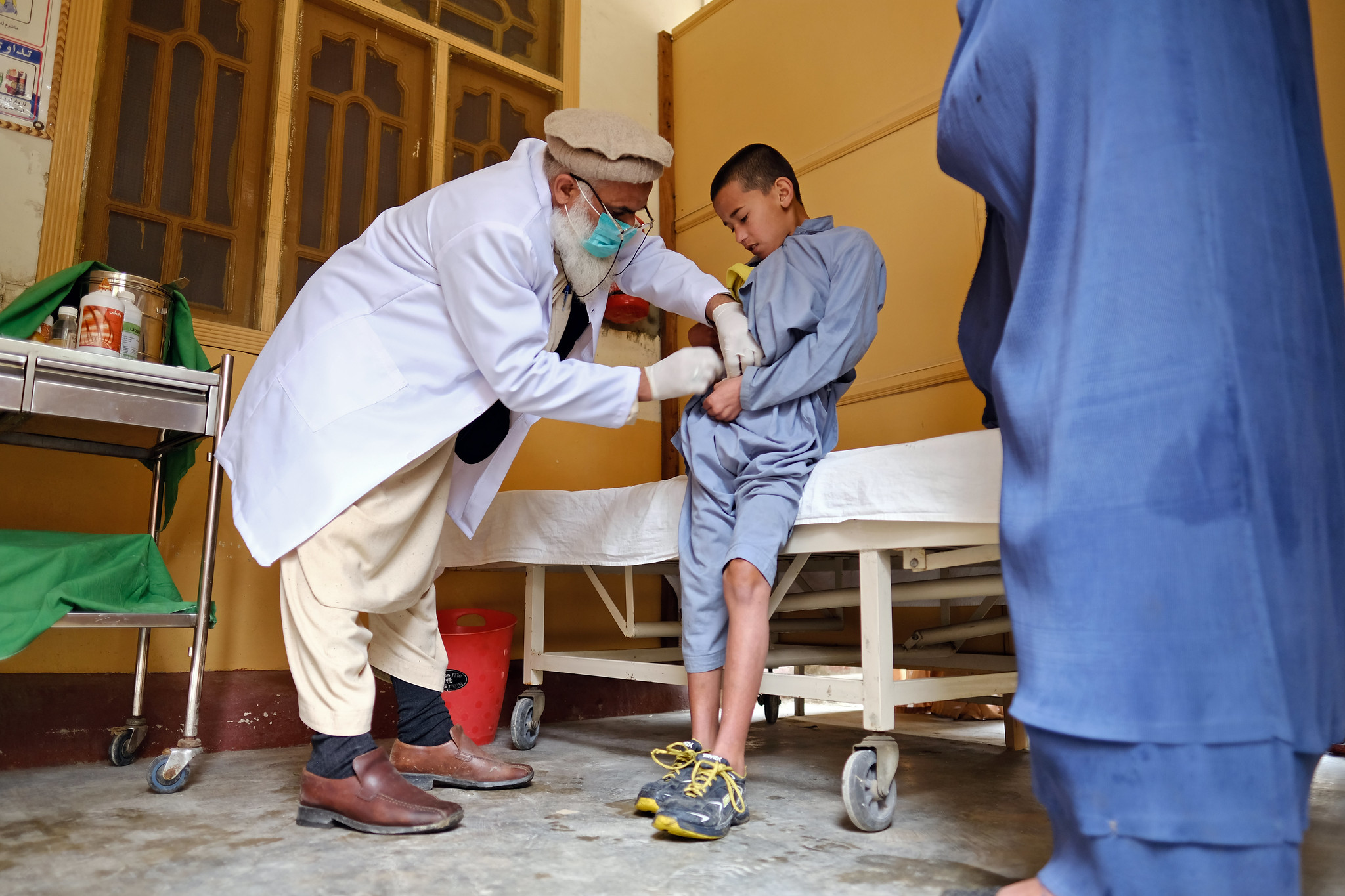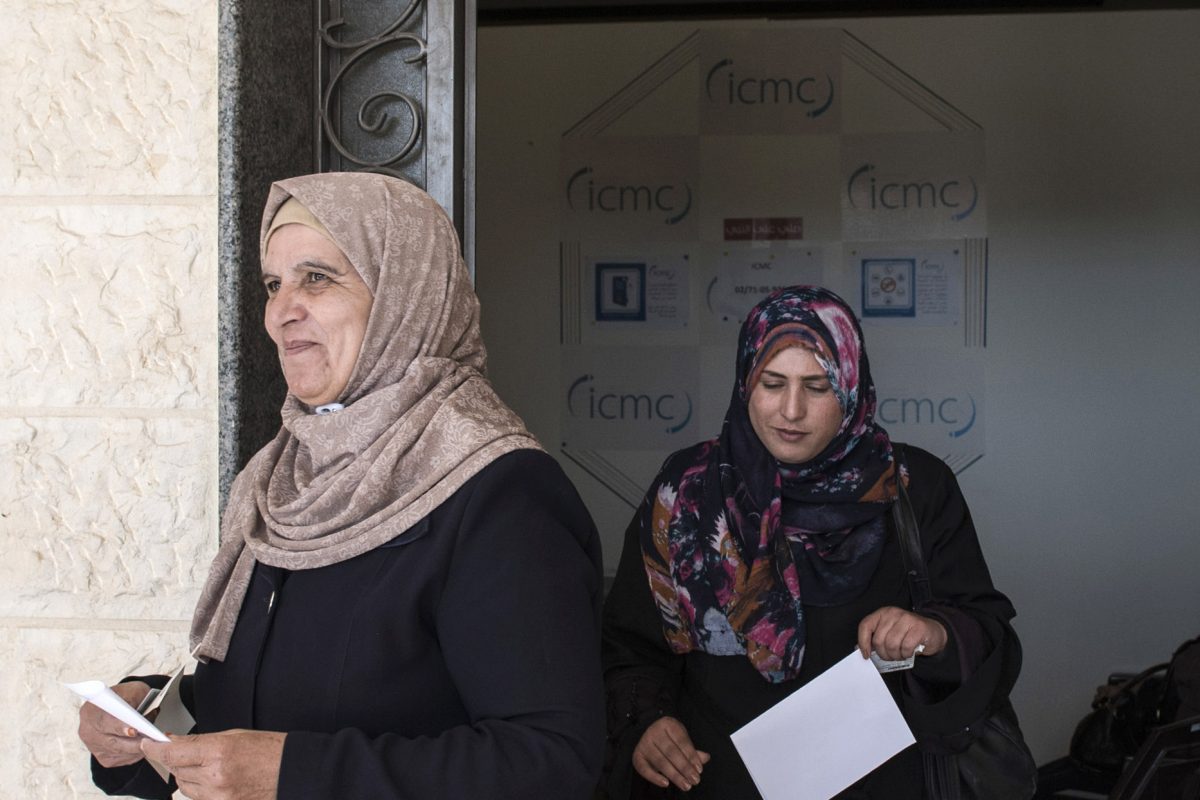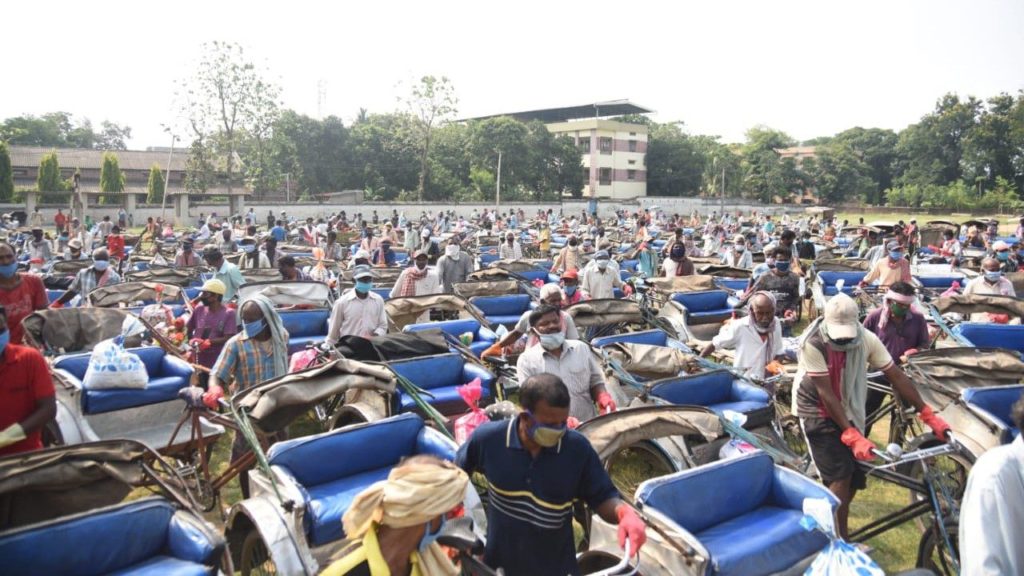Photo: A man sanitizes his hands at ICMC’s health clinic in Koga Camp in northwestern Pakistan. With such protective measures, ICMC was able to continue providing urgently needed medical care amid the pandemic. © ICMC Pakistan
Adaptability was key to ICMC’s humanitarian assistance and development work in 2020. Staff adjusted program activities, introduced COVID-specific measures, and increased overall efforts to serve the vital needs of refugee and host communities in Malaysia, Jordan, and Pakistan.
Ensuring Health in Pandemic Times
ICMC helped refugees overcome the ongoing challenge to stay healthy in the vulnerable context of displacement — a challenge sharpened in 2020 by the COVID-19 pandemic.
In Pakistan, ICMC provided vital healthcare in refugee villages in six districts along the country’s northwestern border with Afghanistan. ICMC’s 11 health clinics offered a range of primary healthcare services from essential, maternal, and early childhood care to childhood immunization, referral of complicated cases to hospitals, counseling, and health education. Nearly 86,500 patients, including 470 persons with disabilities, received both general and specialized primary care.
ICMC provided regular antenatal check-ups for more than 2,500 pregnant women and supported nearly 2,800 deliveries in hospitals and maternity homes. Nearly 700 women gave birth in ICMC delivery rooms in Koga and Hajizai. More than 5,230 mothers-to-be and caregivers learned how to feed their young children so that they would grow and thrive.
As healthcare needs intensified due to the pandemic, ICMC Pakistan supported preparations for a new intensive care unit in the Buner district that is to provide life-saving assistance to COVID-19 patients.
ICMC-led health education sessions with a total of over 16,300 community members highlighted steps to improve hygiene and prevent disease. ICMC Pakistan expanded these efforts during the pandemic, reaching nearly 8,100 people in targeted sessions about COVID-19 and protective measures to contain the spread of the virus. ICMC staff also distributed information materials, protective equipment, and sanitary items to help the refugees stay safe.
In Islamabad and the Punjab province, ICMC Pakistan provided 1,320 various medical treatments to Afghan and other refugees, including more than 60 patients needing chronic care. ICMC healthcare staff ensured that refugees received in-hospital check-ups, medication, and instructions for follow-up care. The medical units shifted to phone service during pandemic lockdowns, responding to urgent needs and spreading the word about preventative actions.
ICMC Pakistan also organized health education activities through a newly launched urban community initiative in the twin cities of Rawalpindi-Islamabad and a new youth center in Hassan Abdal, an urban area to the northwest.
In Jordan, ICMC protection centers in Irbid and Mafraq promoted COVID-19 safety and prevention as part of awareness-raising sessions on a variety of psychosocial issues with over 4,300 refugees and host community members.

The services here, especially the mother care unit, are of great importance for the women in the area. Afghan women can’t go anywhere far from home, not even to a hospital. However, they can come here anytime to receive the care they need.
Dr. Maham Ali, ICMC medical officer assisting refugees in northwestern Pakistan
Meeting Essential Needs
In 2020, ICMC helped forcibly displaced people to live in safety and dignity with support for essential needs like housing and education.
The pandemic’s economic impact hit many already vulnerable households especially hard, increasing the risk of job loss, eviction, and exploitation. Cash assistance from ICMC Jordan allowed families to reduce or avoid debt — and eased related stress. In response to the pandemic, ICMC shifted its usual assessment system from in-person visits to phone-based consultation to ensure timely and safe support.
ICMC Jordan assisted 300 families with cash to pay their rent, 480 with emergency funds to meet urgent needs, and 400 with financial support to ready their living spaces for winter. Through a new winterization assistance project, ICMC was able to provide some 425 additional households, more than 2,000 people total, with cash to cope with increased expenses during the winter season.
ICMC launched another new cash assistance project in 2020 in response to increased needs triggered by the pandemic, supporting over 915 vulnerable families.
ICMC Jordan distributed 5,640 packages with essential non-food items like baby hygiene products, incontinence pads, and other personal care materials.
In Islamabad and the Punjab province, ICMC Pakistan supported with financial assistance a total of 29 extremely vulnerable families from Afghanistan referred by the UN Refugee Agency (UNHCR). The community youth center established by ICMC in the urban area of Hassan Abdal organized donations from financially stable refugee families to support 36 vulnerable households in their community. The center also facilitated support for persons with disability, including wheelchairs to increase mobility.
ICMC worked to ensure that refugee children in Pakistan and Jordan could safely get a quality education in the face of COVID-19.
With ICMC’s assistance, over 19,650 children — more than a third of them girls — in Pakistan’s Khyber Pakhtunkhwa province had access to schooling in 2020. ICMC provided further support with tens of thousands of essential supplies, ranging from textbooks, bags, uniforms, and lap desks to hygiene kits and personal protective equipment for both students and teachers.
In Islamabad and the Punjab province, ICMC helped to enroll more than 30 children in school and ensured their caregivers had assistance with related costs such as uniforms and textbooks. Through ICMC’s sponsorship program, ten boys and girls received support to continue their studies at a high school offering education for Afghan refugee children.
ICMC enhanced its activities in response to the pandemic, assisting with incentive pay for teachers and security personnel not receiving wages, helping disinfect schools, and informing about sanitation measures and adapted teaching methods.
ICMC Pakistan organized a virtual workshop for forcibly displaced children to commemorate World Refugee Day. The three-day event on the global theme “Every Action Counts” allowed the children to express their experiences through art.
Staff at the ICMC-initiated community youth center in Hassan Abdal helped five families with school enrollment for their children. The center also held a series of computer and literacy classes.
The urban cohesion hub established by ICMC in late 2020 in the twin cities of Rawalpindi-Islamabad prepared to launch literacy, English, and computer courses, with more than 125 students attending orientation sessions.
In Jordan, 4,800 children received a kit with educational and recreational materials to support them in their schooling.

I could pay some of my son’s medical bills. Most importantly, I managed to keep my house after ICMC paid the landlord three months’ rent. Now, we are secure and safe.
Syrian refugee in Jordan whose family received financial assistance from ICMC
Laying a Sustainable Foundation
Through a range of vocational training and employment support in 2020, ICMC backed forcibly displaced people on their path to regain self-sufficiency and provide for themselves and their families.
ICMC Pakistan’s livelihood assistance program in Islamabad and the Punjab province offered language and skill development courses for 30 Afghan and other refugees. ICMC conducted 620 individual counseling sessions with refugees about finding employment and other questions related to making a living. Some 15 refugees attended a two-day workshop on setting up a small business, with the majority receiving a starter kit to launch their entrepreneurial initiative.
In Jordan, 200 students from refugee and host communities graduated from ICMC’s vocational training program in 2020. ICMC shifted to remote delivery for many of its courses, offering training in hybrid car mechanics, sewing, beauty and esthetics, solar technology, barbering, pastry making, and mobile device maintenance despite pandemic restrictions. To increase their employability, graduates enrolled in financial literacy courses and received a toolkit for their chosen profession.
More than 575 refugees and at-risk members of the host community completed ICMC Jordan’s Arabic literacy courses, and more than 125 improved their knowledge of English through classes offered in ICMC’s protection centers in Irbid and Mafraq.
ICMC Malaysia expanded its livelihood training offerings in 2020 in response to the pandemic with a new course in manufacturing hand sanitizer. Fourteen Rohingya refugee women, half of them survivors of gender-based violence, participated in the training aimed at increasing their ability to earn an income.
Another new ICMC Malaysia training course saw its first class of graduates in early 2020. Eight refugee women completed a program in basic childcare, with refresher classes held remotely later in the year. The course is intended to strengthen childcare services in the refugee community.
Through the Aurora project in Malaysia, ICMC worked to improve literacy among Rohingya refugees in the Klang Valley, Kuala Lumpur, and Penang.
A total of 85 adults and children completed ICMC’s basic English course in 2020, and 24 attended classes for conversational and intermediate-level English. ICMC and its partners used a hybrid model to meet national health directives, shifting some classes to a remote format and adapting others to allow for socially distanced in-person learning.
ICMC Malaysia also produced a video promoting English-language training as a path of empowerment for uprooted women and a way to increase gender equality within Rohingya refugee communities.
I want to make a positive difference in the lives of these [young] refugees, in their journey of self-discovery.
Rozaimah Khalid, English teacher with ICMC Malaysia
MEMBER’S STORY
Church in India Provides Life-Saving Assistance during Lockdown
On 25 March, with only a few hours’ notice, the government of India imposed a nation-wide lockdown to curb the spread of COVID-19.
The effect on the country’s migrant workers was devastating. Already in a perilous situation, tens of millions lost their livelihood overnight, says Sr. Kochurani Joseph, Secretary to the Catholic Bishops’ Conference of India’s (CBCI) Commission for Migrants North Region. They were left without income, food, or shelter, stranded sometimes thousands of kilometers from their home villages.
ICMC members and partners banded together to give life-saving support to migrants across the country.
The Commission for Migrants of the Conference of Catholic Bishops of India (CCBI) worked with the Archdiocese of Delhi to provide food kits and cooked meals to migrants stranded in and near Delhi when lockdown cut off all transportation. They also aimed to assist migrant laborers in the states of Uttar Pradesh and Haryana.

ICMC members and partners in India banded together to give life-saving support to migrant workers and other daily wage earners across the country. Photo: The Ranchi Archdiocese reached out to cycle rickshaw drivers during the pandemic. Source: Vatican News.
By mid-May, the Commission for Migrants, together with partner organizations, helped to feed over 50,000 people. The Commission and partners also advocated for migrant workers’ access to government food rations.
The Archdiocese of Bangalore’s Commission for Migrants, working with Caritas India, provided food and overnight accommodation for stranded migrants. The Commission and Caritas also supported Nepalese migrant laborers and students from the African continent unable to travel home.
The Ranchi Archdiocese ran shelters for stranded migrant workers for more than two months and worked with Catholic religious organizations to provide food packets to thousands of migrants. The Archdioceses of Bangalore and Jalandhar also provided accommodation and food for migrant laborers.
The Archdiocese of Bombay, based in a major labor migration hub, engaged its 124 parishes to help stranded workers. Some 7,000 migrants and other vulnerable people received two daily meals. The Archdiocese’s social work arm provided over 100,000 migrant laborers and their families with essential support.
Together with partners across India, the Jesuit-run Indian Social Institute assisted over 5,000 migrant families to access government support, stepping in to provide food and shelter when necessary. The Institute also acted as an intermediary for evicted migrant workers to allow them to return to their homes.

